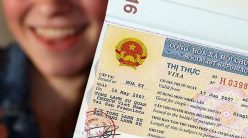Leaders of the appellate court acknowledged this was a procedural violation and petitioned the cassation level to review the judgment.
Nguyen Van Hoang and his wife (living in Trung Hung commune, Co Do district, Can Tho city) are the defendants in the case of a property loan contract dispute. Accordingly, in the course of doing business, he and his wife borrowed money, so they were sued in court. In November 2016, the People’s Court of Co Do district, Can Tho city conducted a first-instance trial and ordered Mr. Hoang and his wife to pay the plaintiff more than 2.3 billion VND.
Only after the trial did the defendant know
Disagreeing with the verdict, he and his wife filed an appeal. At the end of March 2017, the People’s Court of Can Tho City for the appellate hearing denied the appeal and upheld the first-instance judgment.
But according to Mr. and Mrs. Hoang’s presentation, on April 7, when the Judgment Execution Sub-department of Co Do district issued a decision to adjudicate the appellate judgment, they knew that the court had heard the appeal. Because from the time of filing the appeal until receiving the judgment decision, he and his wife did not receive an invitation from the People’s Court of Can Tho City to attend the trial. It was only when they went to copy the appellate judgment at the THA agency that they fell back when they learned that the court had summoned their authorized representative at the first-instance trial.
Mr. Hoang and his wife said: During the district People’s Court’s first-instance trial, on December 2, 2015, they made a power of attorney for Mr. T. (certified) to act as their representative to participate in the settlement of the case on their behalf. . Within the scope of his authorization, Mr. T. has full discretion when participating in dispute settlement, has the right to prepare and sign necessary documents, to participate in mediation, to participate in court sessions and to carry out legal proceedings. other related work. The power of attorney also clearly states: “The power of attorney takes effect from the date of signing and has a term until the above case is settled at the first-instance People’s Court”.
“So, after the first-instance judgment is pronounced, Mr. T. is no longer the authorized representative of my wife and I. For some unknown reason, the appellate level still summoned Mr. T. to participate in the trial as the authorized representative of the defendant, “- Mr. Hoang said.
Thinking that the appellate court had violated the procedure, Mr. Hoang and his wife recently sent an application to the Co Do District Judiciary Sub-department asking for a postponement of the judgment and asked the agency to request the competent authority to cancel the appellate judgment. The district judgment enforcement agency does not accept it because there is no requirement for the judgment enforcement agency to verify the court’s handling and adjudication process.
Court admits wrong
Hoang and his wife also sent a complaint to the People’s Court of Can Tho City and this agency said it was examining and reviewing the case file.
Mr. Hoang’s wife said: “The appellate judgment is a serious procedural violation. Courts and Procuracy work too carelessly, affecting our legitimate interests. Now, our property is being confiscated, so it is the responsibility of the wrong-doing agencies to petition the competent authorities to review the violation judgment to remedy the consequences.”
On August 15, discussing with the Law of Ho Chi Minh City , Chief Justice of the People’s Court of Can Tho City Nguyen Thanh Thien admitted that there were errors in this case. According to Mr. Thien, after studying the complaint and examining the case file, the court found that the complaint of Mr. Hoang and his wife was well-founded because the appellate court made a mistake in determining the litigants’ status.
According to Mr. Thien, at the first instance level, Mr. T. was the authorized representative, but when he went to the appellate level, Mr. T’s representative status was no longer present, but the court still determined that the defendant was the defendant and included in the case as the defendant. wrong. This is a procedural violation stemming from an error caused by the judge, the presiding judge trusting the court clerk, not carefully checking the status of the litigator.
Chief Justice Nguyen Thanh Thien said: “After discovering this error, we made a written petition to the High People’s Court in Ho Chi Minh City to review the judgment according to its competence. At the same time, we will also have a written response to the complaint for the litigant.”
When the reporter questioned the responsibility of the judge, secretary and other people involved for the above error, Mr. Thien said that this was just a mistake, so it did not need to be handled.
Source: According to plo.vn
For support and advice on Business, Investment, Intellectual Property, etc., in the best way, please contact us with the following information:
DHP LAW
Address: L4- 09.OT06 Landmark 4 Building Vinhomes Central Park, 720A Dien Bien Phu, Ward 22, Binh Thanh District, Ho Chi Minh City
Hotline: 0986.938.627
Zalo, Viber, Line: 0986.938.627Facebook: facebook.com/DHPLAW








